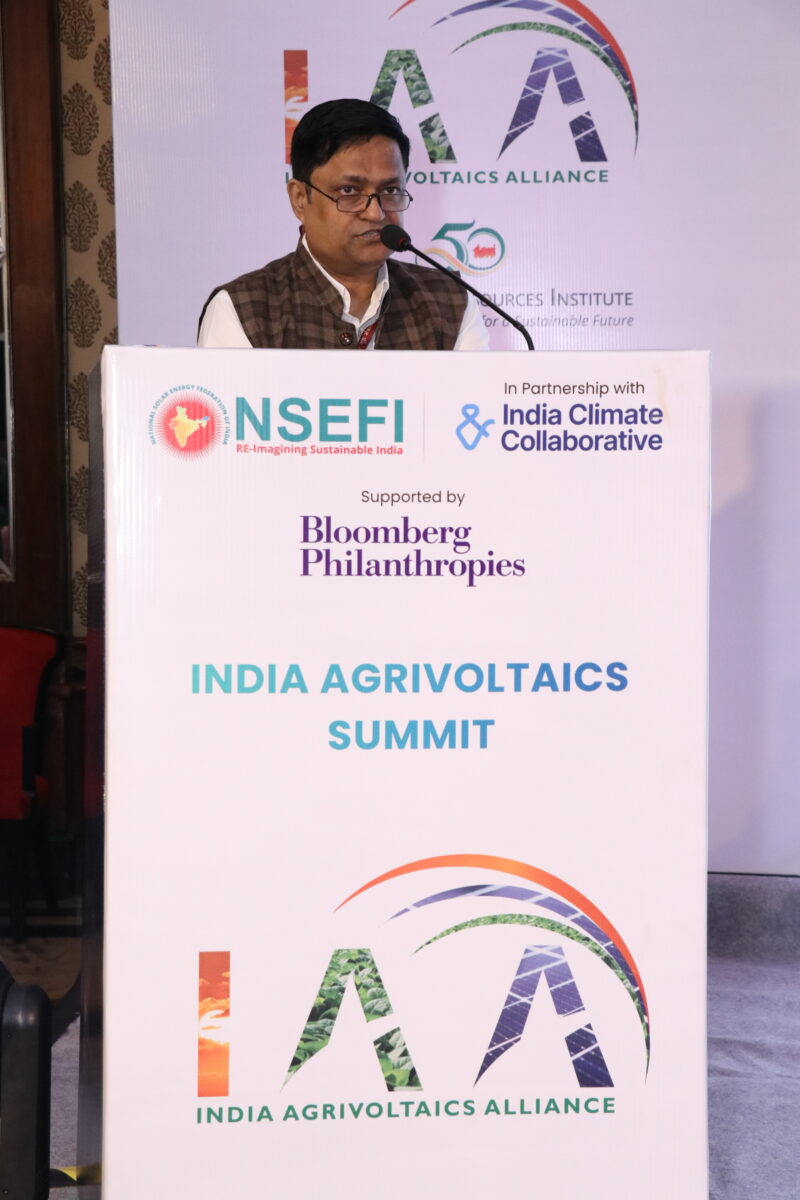India would need to devote large tracts of land to solar installations to meet its ambitious renewable energy goals. At the same time, the nation is primarily an agrarian economy with 60% of its land area farmed.
Agrivoltaics can address this unique challenge by optimising land usage through the co-location of solar panels with agriculture or placing solar panels alongside crops and pastoral lands, for growing crops as well as generating solar energy. Co-locating solar panels with agricultural farms also lays a strong foundation for climate-resilient agriculture and doubling farmers’ incomes.
Sensing this opportunity, 12 organizations have come together to form the India Agrivoltaics Alliance (IAA) to drive agrivoltaics in India. The Alliance was formally launched during the first India Agrivoltaics Summit held this week.
The IAA is supported by the India Climate Collaborative (ICC) and Bloomberg Philanthropies, and brings together organizations across the entire agriculture and solar value chains.
The secretariat of the alliance will be hosted by the National Solar Energy Federation of India (NSEFI). The alliance will work with the Ministry of New and Renewable Energy (MNRE) and the Ministry of Agriculture and Farmers Welfare, Government of India, to drive agrivoltaics in India.
The IAA brings together all stakeholders across the value chain in the solar and agricultural sectors, including industry associations, research institutes, financial institutions like NBFCs, policy think tanks, and civil society organizations. It will work towards developing effective business models and financial instruments for agrivoltaics, study the socio-economic impact of agrivoltaics on India’s agricultural scenario, and strive for the inclusion of women and youth communities of India in the emerging field of agrivoltaics.
Speaking at the IAA launch, MNRE joint secretary Lalit Bohra emphasized that agrivoltaics is an instrument to popularize distributed renewable energy adoption and sensitize the public at large to adopting RE. Agrivoltaics will also offer the triple advantages of saving water, doubling farmers’ income, and making the power sector financially viable, without compromising on food security. Agrivoltaics will help make India’s Agriculture sector sustainable while using clean electricity and promoting energy efficiency.
Bohra also interacted with farmers across the country who have been beneficiaries of agrivoltaics. Farmers described their experiences and how their economic conditions have been positively impacted by the adoption of agrivoltaics.
Deepak Gupta, director general of NSEFI, said, “The launch of the India Agrivoltaics Alliance is a pivotal moment in our nation’s journey towards sustainable energy. Agrivoltaics is not just a technology, it’s a commitment to harmonizing agriculture and solar energy for a greener, more resilient future. This alliance will be instrumental in achieving this harmony, fostering innovation, and driving the transition towards a cleaner and more sustainable energy landscape in India.”
IAA steering organizations include NSEFI, Council on Energy, Environment and Water (CEEW), Central Arid Zone Research Institute (CAZRI), Center for Study of Science, Technology and Policy (CSTEP), International Water Management Institute (IWMI), Indian Society of Agricultural Engineering (ISAE), Indian Chamber of Food and Agriculture (ICFA), The Energy and Resources Institute (TERI), Indo-German Energy Forum (IGEF), Skill Council for Green Jobs (SCGJ), Institute for Sustainable Energy Policies (ISEP) Japan, and Shakti Sustainable Energy Foundation.
This content is protected by copyright and may not be reused. If you want to cooperate with us and would like to reuse some of our content, please contact: editors@pv-magazine.com.









1 comment
By submitting this form you agree to pv magazine using your data for the purposes of publishing your comment.
Your personal data will only be disclosed or otherwise transmitted to third parties for the purposes of spam filtering or if this is necessary for technical maintenance of the website. Any other transfer to third parties will not take place unless this is justified on the basis of applicable data protection regulations or if pv magazine is legally obliged to do so.
You may revoke this consent at any time with effect for the future, in which case your personal data will be deleted immediately. Otherwise, your data will be deleted if pv magazine has processed your request or the purpose of data storage is fulfilled.
Further information on data privacy can be found in our Data Protection Policy.